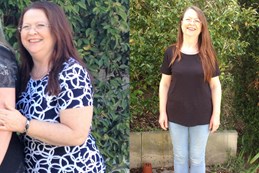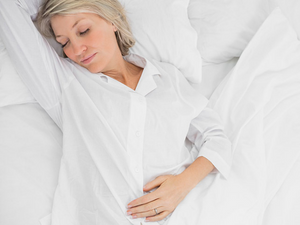How your lifestyle habits can contribute to sleep apnoea

Everyone has those days when you wake up feeling like you still have a few hours of sleep left in you. When you find yourself nodding off on the train on the way to work, or with a deep desire for a nap after lunch.
While everyone suffers from poor sleep on occasion, it becomes a problem if you wake up feeling tired every single day – particularly if you believe you did actually get a full night’s sleep.
For some, this daily sleepiness may be caused by obstructive sleep apnoea (OSA) – a condition where your throat muscles relax too much when you sleep, obstructing the passage that allows in air. This stops you from being able to breathe, and when your blood oxygen levels drop too low, your brain sends a signal to wake you up so you can take another breath.
In OSA these short episodes may happen hundreds of times a night without you even realising – waking you up, disrupting your sleep and causing you to feel tired and groggy the next day.
Another type of sleep apnoea, called central sleep apnoea (CSA), occurs when your brain doesn’t send the right signals to your respiratory muscles that control your breathing; you essentially ‘forget’ to breathe. This condition is less common than OSA and can be caused by conditions like stroke or brain trauma.
Exact data around the number of cases of OSA in Australia is hard to pin down, but it’s known that the condition affects men more than women, and that rates increase with age.

Read: Ian beat sleep apnoea with weight loss
What are the signs and symptoms of sleep apnoea?
It can be hard to tell if you have OSA while you’re sleeping because you’re probably not conscious of what your sleep behaviour is like. It’s a good indication if a partner has mentioned you snore or stop breathing while you sleep.
Other signs may include:
- Daytime sleepiness
- Poor concentration
- Headaches
- Depression
- Reduced libido or impotence
- High blood pressure
How is sleep apnoea diagnosed?
Sleep apnoea is diagnosed by undergoing an overnight sleep study, conducted either at home or at a sleep clinic.
What causes obstructive sleep apnoea?
There are a range of risk factors that can contribute to OSA. They include:
- Being overweight or obese
- Excess alcohol consumption
- Smoking
- Physical inactivity
- Older age
- Being male
- Menopause
- Having a narrow airway or large tongue
Why is sleep apnoea bad for your health?
A lack of good quality sleep has far-reaching consequences for your health; everything from reproductive health to cognitive development, to emotional regulation and muscle growth relies on a good snooze. Short-term consequences of continuously disrupted sleep include reduced memory and cognition, mood disorders like depression and a diminished stress response. Long-term, health consequences include type 2 diabetes, hypertension and cardiovascular disease.
Severe OSA is also an independent risk factor for cardiovascular disease and stroke. Left untreated, the condition can be fatal. In 2018, 1,111 deaths in Australia were related to OSA (67 percent men, 33 percent women).

Read: Weight gain and sleep apnoea became a vicious cycle
Can sleep apnoea be cured?
While there is no outright cure for OSA, there are ways it can be treated to significantly reduce symptoms and the number of episodes you experience each night. These include changing your lifestyle habits that are within your control:
- Lose weight, if you’re overweight or obese
- Increase physical activity
- Reduce alcohol consumption
- Stop smoking
If you’re concerned that you may have OSA, speak to your doctor about the medical treatments which include:
- Sleeping with a Continuous Positive Airway Pressure (CPAP) device
- Sleeping with a special oral retainer fitted by a dentist
- Surgery, if other treatments aren’t effective
Weight loss and sleep apnoea
Excess weight is strongly linked to OSA, and the higher your BMI, the worse the condition can be. In a 2019 survey of CSIRO Total Wellbeing Diet members, 83 percent of respondents who experienced sleep apnoea were classified as being obese.
In overweight and obese people, fat deposits around the throat can narrow the airway and cause OSA episodes. This is why weight loss is a vital component of any treatment for the condition – especially when the severity is mild-to-moderate. Research shows that a 10 percent reduction in excess body weight can improve symptoms and reduce the number of OSA episodes a night – potentially stopping them completely in some people.
For those with severe OSA, weight loss on its own may mildly improve the condition, but most people will likely also need continuous use of a CPAP device.
Treating OSA with weight loss also offers other health benefits that the use of a CPAP device on its own doesn’t offer, like reduced cardiovascular risk and better diabetes control.
OSA is a condition that can greatly reduce your energy levels and lead to dangerous health consequences. If you’re concerned about the condition or want to learn more about treatment, talk to your GP.


